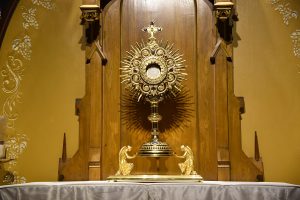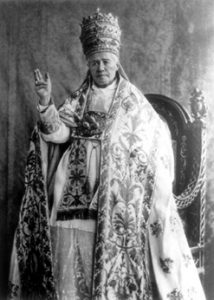by Cesar Franco
When news spread that the coronavirus was on American soil and that shelter-in-place orders were possible, there was a rush to the grocery stores. People wanted to stock up on goods in the face of uncertainty. Curiously, there was no rush to the churches.
No one thought they would become inaccessible.
Without warning, Catholics worldwide are now experiencing life without Mass, Confession and Holy Communion. Even praying before the Blessed Sacrament is barred in some places. Churches have been deemed “non-essential,” and the faithful are encouraged to watch their favorite Mass online, much like a favorite television show.
However, the best online Masses can never substitute actual Mass and Holy Communion. While we have plenty to eat after rushing for groceries, our souls are starved since we are barred from the Holy Table, and deprived of the supernatural and actual graces of Communion. This leaves us more vulnerable to temptation and sin. The struggle to be in the state of grace is more difficult.
The Effects of Holy Communion
The situation merits a reflection about the Blessed Sacrament. Holy Mother Church teaches that “Holy Communion acts spiritually as bread and wine act materially.” The body assimilates bread and wine and is nourished, strengthened, refreshed. Analogously the same happens to our souls at Holy Communion. This sacrament imparts actual graces that enlighten the intellect and strengthen the will to resist the temptations of the world, the flesh and the devil. With infinite goodness and understanding, Our Lord is the Divine Physician Who enters our souls to cure us of our weaknesses and console us in our sufferings.
“My delights were to be with the children of men”
Father Francis Spirago in The Catechism Explained says that Holy Communion is like a perpetuation of the Incarnation. When Our Lord took on flesh He united Himself with mankind in general. In Holy Communion He unites Himself with each person individually. “He that eateth My flesh and drinketh My blood, abideth in Me, and I in him.” (John 5:56)
This reality is sublime. Our Lord delights to enter our souls! Like two pieces of wax are melted and amalgamated into each other, so completely does He unite Himself to us in Holy Communion. Our Lord absorbs our nature into His own. This action is compared to leaven that changes a quantity of flour or to a wild tree that is ennobled by being grafted with a cultivated tree.
Another effect of this sacrament is that it helps us to persevere in doing good. Just like the Prophet Elias was strengthened by the bread of the raven, so are we fortified by this sacrament. The papal document Sacra Tridentina issued and approved by Pope Saint Pius X, affirms;
“Moreover, the desire of Jesus Christ and of the Church that all the faithful should daily approach the sacred banquet is directed chiefly to this end, that the faithful, being united to God by means of the Sacrament, may thence derive strength to resist their sensual passions, to cleanse themselves from the stains of daily faults, and to avoid these graver sins to which human frailty is liable.”
This holy pope not only believed in the efficacy of Holy Communion but in face of the evil of his times, he lowered the age of receiving First Communion to seven. He desired that children share in the Eucharist’s great benefits.
Complacency Kills
Today there is a tendency towards negligence and the dissolution of the formal institution of the Catholic Church. With the recent Pan-Amazon Synod there were many voices demanding married clergy, women deacons and the eco-theology manifested by the Pachamama worship.
We must be careful not to become comfortable with the cessation of Mass and Communion. “Catholics don’t have to worry about not receiving Sacramental Communion because spiritual communion is always available.” This mindset fails to see the big picture of the auto-demolition of the Church.
Because of Original Sin, man always opts for the easy way. How many Sunday Catholics will simply not utilize confession and spiritual communion? The Blessed Sacrament will always impart grace to a soul free from mortal sin. Holy Mother Church teaches that the sacraments impart grace ex opere operato.
The same cannot be said of spiritual communion. When done with attention, devotion and love spiritual communion can yield very great fruits. But how many will make the effort at home distracted by television and a million other things?
Daily Spiritual Communion
That said, to persevere in the state of grace in these circumstances, spiritual communion is a great help. Sin abounds everywhere, even in your phone. The devil does not follow the shelter-in-place orders. The cessation of the sacraments offers him a unique opportunity for the perdition of souls. Those who depend on daily Communion must be proactive. When deprived of the Holy Table, God provides a less perfect, but potentially fruitful means of uniting with Him.
The Catechism Explained affirms:
“Spiritual communion consists in awakening within the heart a lively desire to receive holy communion.
To make a spiritual communion is a matter of no difficulty, it is enough to recollect one’s self for a few minutes, to place one’s self in spirit before the tabernacle, and to say, ‘Lord Jesus, come, I beseech Thee, into my heart.’”
This practice is most efficacious in obtaining graces for the soul. Spiritual communion is like a silver vessel and actual communion a golden vessel. Our Lord not only cured those He met in person, but also those who ardently desired to be cured from afar like the centurion’s servant. The words “I am not worthy that Thou shouldst enter unto my roof, but only say the word and my soul shall be healed,” come alive with new meaning.
It should be noted that one must be in the state of grace (whether by sacramental confession or an act of perfect contrition) to make a spiritual communion. Fr. Francis D. Costa, S.S.S. (Professor at St. Joseph’s Seminary of the Blessed Sacrament, Cleveland, Ohio) gives the conditions necessary for making a spiritual communion:
“Since a Spiritual Communion is an earnest desire to receive the Sacrament, this act can be made only under the following conditions:
(1) the person must be baptized, since baptism in the door to the sacraments;
(2) the person must be old enough to make a formal will-act, since a free act of faith and love are absolutely required;
(3) the object of this deliberate desire must be the Holy Eucharist; [since the Sacraments are propter homines, an angel could not make a Spiritual Communion;]
(4) The person must be in the state of grace, since this is a necessary condition for Holy Communion, and also because this desire is essentially an act of love of Christ in the Blessed Sacrament.”
The Incarnation Was Obtained by Ardent Desire
Saint Louis de Montfort, in commenting about devotion to Our Lady, affirms that all the prayers and sacrifices of the just of the Old Testament did not merit the coming of the Messiah. The force of Our Lady’s prayers and sanctity alone moved God to intervene in history. She was “full of grace” and her ardent desire brought about the Incarnation. Says Fr. Spirago:
Our Lord did not come to earth until His advent was ardently desired and, in like manner, He is reluctant to visit the soul that does not earnestly long to receive Him.
We should be afflicted that the Blessed Sacrament is withheld from the faithful. It is not just about me and the negative impact on my spiritual life. We must think about the salvation of souls, the auto-demolition of the Church that this represents and the offense against God that is being perpetrated. Let us zealously beseech Our Lady to end this catastrophic suppression of public Mass. May she fill our souls with burning desire to be united with Our Lord in Holy Communion once again.

